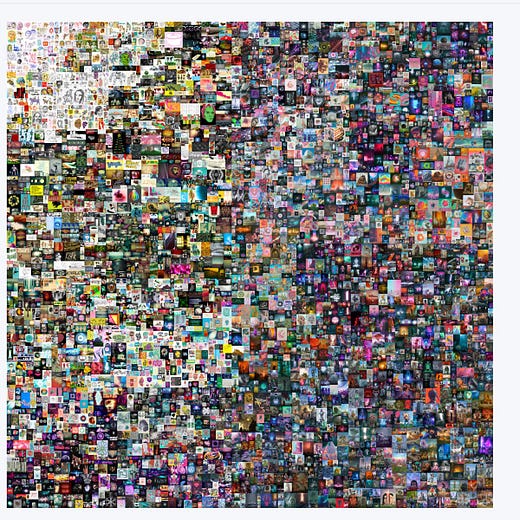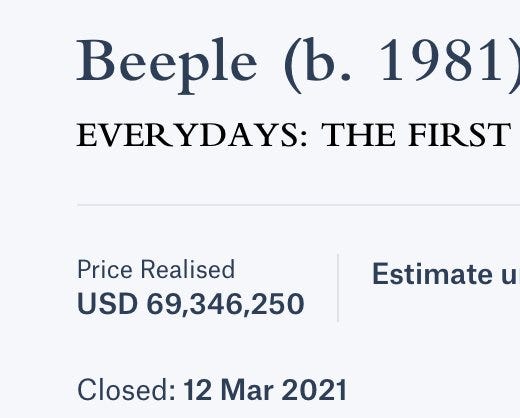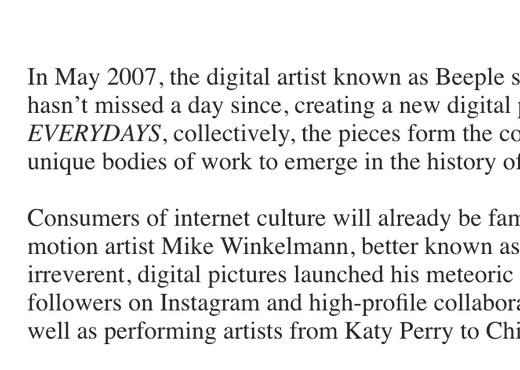The Social Media Report #19
NFTs tip into the mainstream, but at what cost?
In this week’s edition we take a look at NFTs, how they are bring order to virtual worlds, and the issue of piracy and regulation. We also have as usual my must-read articles of the week.
Subscribe below if you’ve been sent this, and you’ll get every edition soon as it’s out.
Last month, a property sale went through that made the headlines. Nine blocks of land in an exclusive part of town known as Genesis sold for a record $1.5m. The estate however is virtual. The patch of nine prime, investable plots land are in the online world Axie Infinity, and the sale was the largest non-fungible token (NFT) transaction of all time. NFTs are big business, and in addition to virtual land, can take the shape of art, music, collectables, trading cards, identities and more - but all, of course virtual. As parts of social media become NFTs, from individual pieces of social media content to parts of virtual worlds, where is the NFT space going and how does it work?
From land to music - how NFTs are reshaping media: a non-fungible token is a unique certificate of ownership of a digital item. Examples of NFTs include the Kings of Leon’s most recent album, Jack Dorsey’s first Tweet, and the one that made the headlines this week for overtaking the Axie Infinity land sale, the Christie’s auction of a piece of digital art by Beeple which fetched an eye-watering $69m. NFTs are largely seen as pieces of digital media, which if course means they could be copied and misused too.
What does ownership really mean when it comes to NFTs? When each NFT sells, the owner is then in possession of that item. If it’s the prime real estate in a game, that has use, as well as value. The land could be re-sold, rented out, access to it could be charged for, and so on. It cannot easily be copied. If it’s a piece of media, a tweet, an album or digital art, however, while the single owner of each item is official, the item could be copied and viewed widely, which is one of the reasons the NFT space has been such a topic of discussion.
As understanding around digital ownership develops, NFTs are shaping an array of different areas of concern. Identity, currency, copyright and value of media to name just a handful. The Kings of Leon album has made $2m in sales. The Beeple artwork is going to be on view in an online museum. And with the advent of accessible Virtual Reality, the role NFTs will play in filling virtual worlds will only intensify.
Who will govern and regulate NFTs and virtual worlds? I’ve written before about regulation and safety on social media, and NFTs add another dimension (and generation) to the issue of fit-for-purpose policy. While the world’s governments grapple with issues like whether Facebook and Instagram should share data, virtual worlds are prospering and investable assets are forming the basis of new online nations. Piracy is rife with NFTs, so regulation is key.
I’m currently exploring NFT virtual worlds like Decentraland (username @drewbenvie) so I can do some prospecting for land and explore the business opportunities there, as well as the marketplaces Opensea and Rarible, for the collectibles. While I’m not much of a virtual collector, I know my way around virtual worlds having worked with Second Life back in 2007. To me it feels like NFTs are what was missing from virtual worlds. The evolution of this space I hope will bring greater opportunity and also order to fast-developing spaces online.
My must reads from this week
Here are the stories that I have been reading this week.
Fund managers in China see fame on Weibo: the latest social media trends in Asia is connecting finance tips with huge audiences.
Mark Zuckerberg podcast interview on joining the dots between social media and VR: the Facebook CEO talks on the future of mind reading and virtual reality.
Facebook’s training to deal with accusations of polarisation: how staff are given a playbook for rebuttals.
How creators are monetising through outsourcing their decisions: NewNew allows viewers decide what creators do next.
Government
UAE and Russia throttle Clubhouse and Twitter respectively: the countries have started slowing down social networks to the point they are unusable, rather than outright block access.
The FCC has deemed five Chinese firms a threat to US security: Huawei and ZTE among them.
UK trials public internet browser monitoring: police forces and internet service providers are testing surveillance tech for the web browsing habits of every citizen.
Virtual work
Gather secures $26m in funding for video calling with virtual worlds: the platform enables people to gather in virtual spaces online.
Asana is on the up: beating expectations with its most recent set of results.
Why you need breaks between meetings in a virtual world: virtual work can mean back-to-back video meetings, whereas in the old world travel gave a mental buffer.
AI
How AI can improve innovation for remote workers: some ideas on how smarter tech could see, from what you are working on, how you can be matched up with people to chat to or media to consume to add more relevance to your work and down time.
Chinese AI firm Megvii goes public: the first major Chinese artificial intelligence company to go public.
Facebook video AI training programme launches: a project to understand what is happening in videos, using data from videos publicly available on Facebook.
Audio social media
Twitter Spaces to roll out in April: the Clubhouse clone, available currently to only a small number of users, to open up in the next month.
Clubhouse rolls our profile and club linking: new updates coming out weekly at the moment for the audio social network.
The Social Media Report is written by Drew Benvie, founder & CEO of Battenhall, The Drum, CIPR and GDXA’s social media consultancy of the year 2020.
You can follow The Social Media Report on Twitter at @TheSMReport. Suggestions for stories can be emailed to db@battenhall.com. Thank you for reading, and see you next time.







